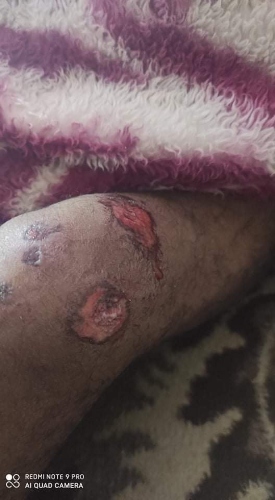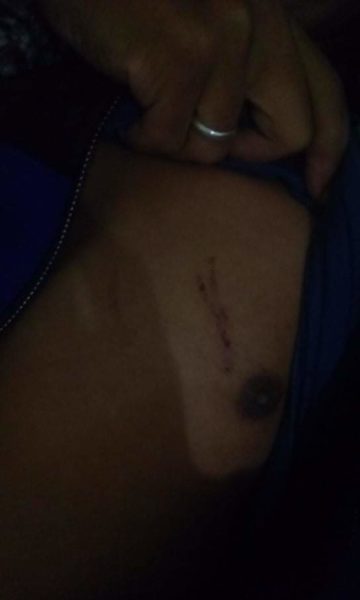They were just beating us from time to time, letting the dog bite us
| 12.10.2021 | Near Slivarovo, Malko Tarnovo Municipality, Bulgaria | Anonymous Partner | 41.969361, 27.747833 | Bulgaria | Turkey | no | no | yes | yes | no | no | no | 17 - 26 | 5 | Morocco | 8 | beating (with batons/hands/other), kicking, dog attacks, destruction of personal belongings, theft of personal belongings, non-consensual recording/photographing | 2 male police officers, with 1 police dog, in a blue uniform with ‘police’ written on it and the Bulgarian flag in an unmarked silver car, 4 officers from the Bulgarian Gendarmerie (2 male, 2 female) in an unmarked white van, and 2 officers wearing an army green camouflage uniform in a Land Rover |
The respondent is a 26-year-old man from Morocco who was pushed back from Bulgaria to Turkey on the 10th of December 2021, together with five others who were in his group. The group was composed of only men, of which two were 17 years old, and all Moroccan. The group had crossed the border one week prior to the pushback, on the 3rd of December 2021 close to Kırklareli, Turkey. The respondent explained they were consciously avoiding the cities and villages, because they heard that the Bulgarian authorities were very violent. They had been walking for seven days mainly through forest and mountain terrain. On the third day, the 6th of December 2021, the respondent reports that one member of the group could not carry on with the journey. Despite them trying to motivate him to continue, they eventually left him in the forest and continued their journey. After their pushback to Turkey they met again and learned from him that a police officer found him in the forest and let a police dog bite him. He was robbed of his belongings, like his money, clothes, and phone. At one point the group was walking on the road where a farmer spotted them. The respondent assumed it was this person who called the police and made their whereabouts known. Reportedly, they started hiding their money and phones to make sure the police would not take them. He stated they did not want to run because they had heard a dog barking, and knew that if they tried to run, the dog would be released to bite them.
"That's why Bulgaria is hard to walk and cross the border, because people are helping the police so much. Whenever they see you, they will call the police immediately."Approximately half an hour after the police were called, two vehicles arrived: one Gendarmerie car and one police car. According to the respondent, the police vehicle was a 4x4 silver car, and the Gendarmerie was a white van, both without any writing on it. The respondent reported there were two male officers in a blue uniform with ‘police’ written on it and a Bulgarian flag, they had one police dog that was also in a blue vest. There were four Gendarmerie officers, two male and two female, also in a blue uniform. The first thing one officer asked about were their phones and money. When one group member was slower than the others in retrieving his phone, the officer reportedly beat him once with the back of his gun in the back of his neck, and then slapped him in the face with his hand. The respondent explained both officers were involved in the beating, either slapping or kicking them one by one. The police dog, a German shepherd, was also involved and was trying to bite them. The respondent was bitten in his leg and his chest. After the beating, the officers told the group to follow them to the van. According to the respondent, on the way one officer took out his phone and started to record the group, while laughing at them. The respondent said he saw him sending the video on WhatsApp. The police officers also taught the group one word they had to say when they arrived at the van where the Gendarmerie officers were waiting. The respondent did not remember the word, he assumed it to be Russian or Bulgarian. When they said the word, the Gendarmerie officers reportedly started beating them. The respondent stated being the first to be beaten by one of the female Gendarmerie officers. He mentioned her to have something metal on the outside of her glove on all fingers that she used to punch him. He reportedly lost a tooth because of this. According to the respondent, the beating lasted approximately half an hour. Reportedly, when every group member was searched and the officers would find nice clothes or shoes on them, they would take it from them. They both took the clothes off of their bodies and from their bags. Eventually they were left in just T-shirts and pants, most of them without shoes. The respondent also mentioned that when the officers found two Qurans in their bags, they ripped them and threw them away. Because both people and property associated with a group that shares an identity trait can be targets of hate crimes, this action might be understood as a potential hate crime (under ‘What is hate crime?’) as classified by the OSCE Office for Democratic Institutions and Human Rights.
"On the way to the van he took his phone and did a video, laughing at us, and I saw him sending the video on Whatsapp."Before the group was put in the van, the officers told them to stand next to each other with their arms by their sides. One of the female Gendarmerie officers put the dog in front of them and proceeded to take a picture with her phone. Then the group was put in the back of the van, the two male police officers stayed at the place of apprehension. The respondent explained that the van was empty and did not have any windows or chairs in the back of the van. Reportedly, it smelled like animals had been inside previously or as if the van had been used to transport animals. The group was told to look down. During the ride the officers apprehended two more people, both of them Moroccan. The respondent did not see how they were apprehended, however they were loaded into the back of the same van as the original transit group. Reportedly, before they got to their destination, the two female Gendarmerie officers were dropped off somewhere else. After what felt like two hours of driving they arrived at another parked vehicle, a 4x4 Land Rover, which was waiting for them. Upon their arrival the Gendarmerie officers reportedly ordered the group to clean the transit van they arrived in. After, the group was brought to the other parked car with two male officers who were wearing army green camouflage uniforms. According to the respondent, one of them was drinking alcohol and the other was smoking. The officers in army uniform proceeded to ask them if they had any belongings and reportedly beat them after. One group member was punched and kicked; the others were just kicked once. Afterwards the group was put into the Land Rover which was described as a small 1,5 m2 space where all seven were forced into.
"They went to a place where they were hiding wooden batons. One of them was using his knife to make it sharper and he started beating us."The respondent explained that the border was only 60 kilometres from their location, but that they were driving double the distance. According to him, the officers in army uniform took them to the farthest place of the border where they stopped and got out of the car. The officers then retrieved wooden batons from a hiding place under a border fence. One group member managed to run away through the gate to the Turkish side; the respondent said this angered the officers so that they proceeded to beat the remaining members of the transit group once each. The respondent explained they walked 40 kilometres on the Turkish side before they encountered a village. They met Turkish police who helped them go back to Istanbul. The Turkish officers reportedly gave them water, food, and money (100 Turkish Lira) to go back. The respondent stated they did not ask for asylum at any point. The Bulgarian officers did ask them where they wanted to go, after telling them they wanted to go to Germany, the officers laughed at them.


